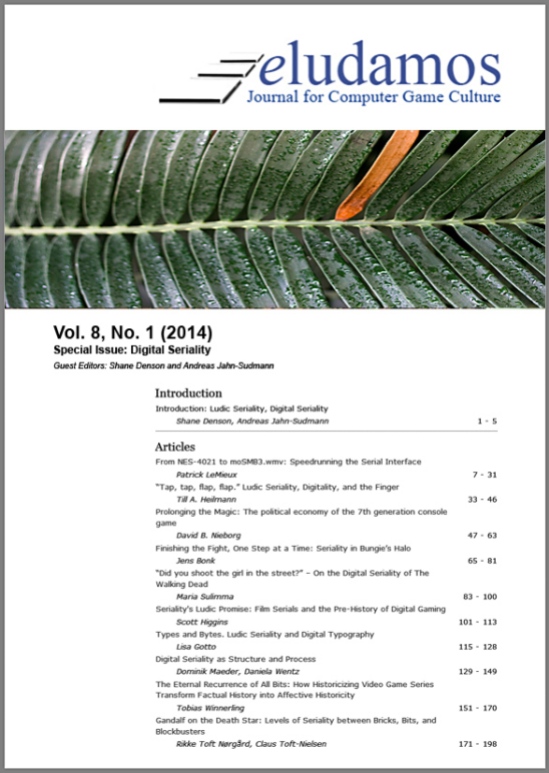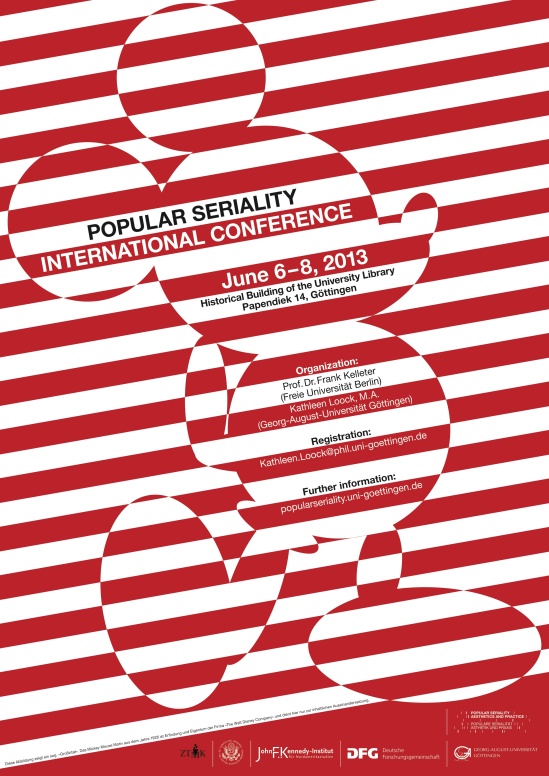
At the upcoming conference of the Society for Cinema and Media Studies (March 25-29, 2015 in Montréal), I will be participating in a panel on “Digital Seriality,” co-chaired by Andreas Jahn-Sudmann and Scott Higgins, along with Dominik Maeder and Daniela Wentz.
Here is our panel description, along with links (below) to the abstracts for the various papers:
Digital Seriality
Seriality and the digital are key concepts for an understanding of many current forms, texts, and technologies of media, and they are implicated in much broader media-historical trajectories as well. Beyond the forms and functions of specific cultural artifacts, they are central to our global media ecology. Surprisingly, though, relatively few attempts have been made at thinking the digital and the serial together, as intimately connected perspectives on media. This is precisely the task of the present panel. On the one hand, the papers interrogate the serial conditions, forms, and effects of digital culture; on the other hand, they question the role of the digital as technocultural embodiment, determinant, or matrix for serialized media aesthetics and practices. The panel thus brings together heretofore isolated perspectives from studies of new media culture (cf. Manovich 2001, Jenkins 2006) and emerging scholarship on seriality (cf. Kelleter 2012, Allen and van den Berg 2014).
Seriality and digitality are understood here in terms not only of their narrative/representational manifestations but also their technical-operational impacts on our media environments. Accordingly, Shane Denson and Andreas Jahn-Sudmann’s paper looks to the case of the Xbox One in order to show how computational platforms affect the serial forms and practices emerging within, among, and around digital games (“intra-,” “inter-,” and “para-ludic” serialities; cf. Denson and Jahn-Sudmann 2013), but also how these platforms inscribe themselves – as a serialized factor in their own right – into the parameters of computational expression. Whereas video games serve here to highlight the differences between digital and pre-digital serial forms, Dominik Maeder approaches things from the opposite direction, arguing that the interfaces of Netflix, Hulu, and other digital streaming services embody a form of spatio-temporal serialization that, already anticipated by TV series, is closely related to (pre-digital) televisual seriality. As a complementary perspective, Daniela Wentz’s paper shows how certain TV series anticipate their own digital afterlives in the form of fan-made gifs and memes. Finally, Scott Higgins provides an “archeological” perspective, exploring the ludic dimensions of the operational aesthetic, which anticipates computer games in pre-digital forms, thus offering a fruitful case for rethinking digital seriality from a media-comparative perspective.
Bibliography
Allen, Robert, and Thijs van den Berg, eds. Serialization in Popular Culture. London: Routledge, 2014.
Denson, Shane, and Andreas Jahn-Sudmann. “Digital Seriality: On the Serial Aesthetics and Practice of Digital Games.” Eludamos: Journal for Computer Game Culture 7.1 (2013): 1-32.
Jenkins, Henry. Convergence Culture: Where Old and New Media Collide. New York: New York UP, 2006.
Kelleter, Frank, ed. Populäre Serialität: Narration – Evolution – Distinktion. Zum seriellen Erzählen seit dem 19. Jahrhundert. Bielefeld: Transcript, 2012.
Manovich, Lev. The Language of New Media. Cambridge, MIT, 2001.
Finally, here are links to the individual abstracts:
Shane Denson and Andreas Jahn-Sudmann, “The Xbox One as Serial Hardware: A Technocultural Approach to the Seriality of Computational Platforms”
Dominik Maeder, “Serial Interfaces: Publishing and Programming Television on Digital Platforms”
Daniela Wentz, “The Infinite Gesture: The Serial Culture of the Gif”
Scott Higgins, “Ludic Operations: Play and the Serial Action Sequence”




